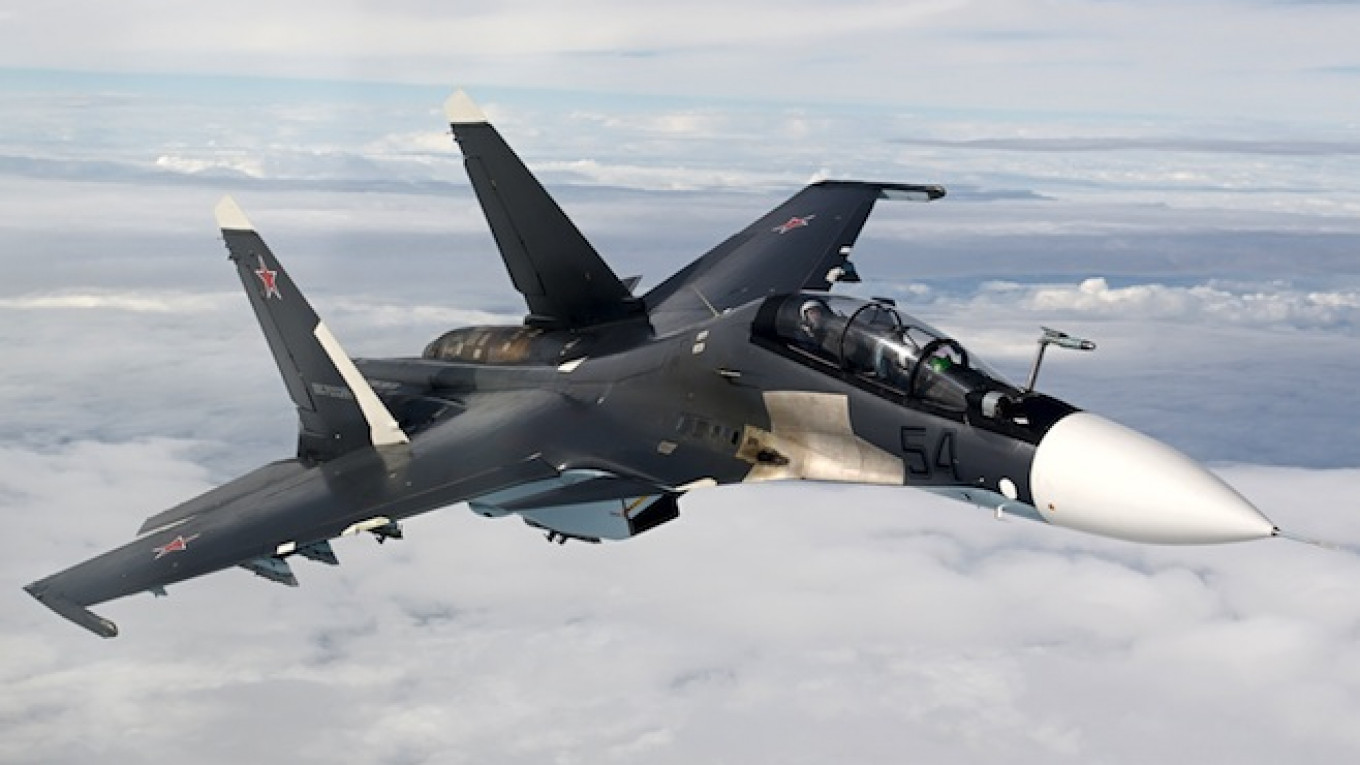The Russian Defense Ministry signed a contract Monday with aircraft manufacturer Irkut for the delivery of eight Su-30SM multi-role fighter jets, and teed up a larger contract for up to 75 of the military planes, Deputy Defense Minister Yury Borisov said, state-run news agency RIA Novosti reported.
Borisov, the Defense Ministry's man in charge of military procurements, said the planes were being purchased for the Russian navy, and “will give additional orders to the Irkut Aviation Plant, and secure its corresponding economic stability.”
Irkut is one of Russia's three largest military aircraft manufacturers, alongside the more internationally famous MiG and Sukhoi aircraft companies. All three firms are owned by the United Aircraft Corporation, a large state-owned aviation industry holding.
The company is completing the final deliveries of a 2011 contract for 60 Su-30SM fighter jets, and according to Borisov the Defense Ministry is preparing to sign a follow-on contract next year. The new agreement would see 20 to 25 of the jets delivered annually to the military for a period of three years.
The Su-30SM is the latest modification of the Russian Su-30 heavy multi-role fighter, based on the older MKI model developed for export to the Indian air force. The Su-30 is itself based on the Soviet-designed Su-27 Flanker fighter jets.
The Su-30 family of fighter jets is one of Russia's most popular export items. Over 200 Su-30MKI jets have been delivered to India out of the total 272 on order, and 44 have been delivered to the Algerian air force. Malaysia has purchased 18 of the jets.
Twelve of the Su-30SM fighters ordered under the 2011 Defense Ministry contract were set aside for the Russian navy, which operates the fighters as maritime strike aircraft.
In August, head of naval aviation Major General Igor Kozhin said the navy would procure around 50 of the Su-30SM fighters by 2020. This would bring the total number of Su-30SM fighters in service with the Russian military up to 160, the Vedomosti business daily reported Monday.
Borisov did not say how much the Defense Ministry will be paying for its next batch of Su-30SM fighters, but according to Vedomosti, the price for the export-oriented Su-30MKI variant stands at 2 billion rubles ($30 million) per unit.
The Defense Ministry is also negotiating a follow-on contract to a 66 billion ruble ($1 billion) agreement with the United Aircraft Corporation (UAC) for 48 of the newer Su-35 heavy multi-role fighter jets. Like Irkut, Sukhoi is completing its existing contract, which was signed in 2009, with the Defense Ministry this year.
A more substantial modification of the Soviet Su-27 than the Su-30SM, the new Sukhoi 35s are intended for service in the Russian air force as a stopgap between the Su-30 and the Sukhoi T-50 stealth fighter, which is slated to begin serial production as early as next year.
However, pricing concerns led Borisov to announce earlier this year that the Defense Ministry would only buy 12 of the new T-50 stealth fighters in the first purchase due to Russia's economic crisis and corresponding budget cuts. Instead the air force will rely on the Su-35 for a little longer.
At the MAKS air show held outside Moscow in late August, UAC CEO Yury Slyusar said his company would sign a 100 billion ruble ($1.5 billion) contract with the Defense Ministry for another 48 Su-35 fighters by the end of this year.
An earlier version of this story incorrectly stated that the Russian navy flew Su-30 fighters off of the Admiral Kuznetsov aircraft carrier. While the Russian navy does operate Su-30 fighters, it uses a variant of the aircraft known as the Su-33 for service on the Kuznetsov aircraft carrier.?
Contact the author at [email protected]
A Message from The Moscow Times:
Dear readers,
We are facing unprecedented challenges. Russia's Prosecutor General's Office has designated The Moscow Times as an "undesirable" organization, criminalizing our work and putting our staff at risk of prosecution. This follows our earlier unjust labeling as a "foreign agent."
These actions are direct attempts to silence independent journalism in Russia. The authorities claim our work "discredits the decisions of the Russian leadership." We see things differently: we strive to provide accurate, unbiased reporting on Russia.
We, the journalists of The Moscow Times, refuse to be silenced. But to continue our work, we need your help.
Your support, no matter how small, makes a world of difference. If you can, please support us monthly starting from just $2. It's quick to set up, and every contribution makes a significant impact.
By supporting The Moscow Times, you're defending open, independent journalism in the face of repression. Thank you for standing with us.
Remind me later.


